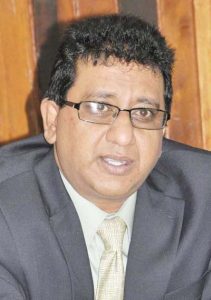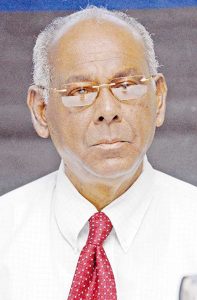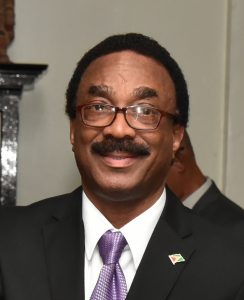Lawyers argue at Appeal Court… Overturning CJ’s ruling on Nat’l Register could have
Should the Court of Appeal reverse a ruling by Chief Justice Roxane George which makes it unconstitutional to remove persons from the National Register of Registrants (NRR) unless they are dead or otherwise disqualified in accordance with Article 159 (2), (3) and (4) of the Constitution, there could be severe consequences on the upcoming General and Regional Elections fixed for March 2.
This is the position of former Speaker of the National Assembly Senior Counsel Ralph Ramkarran and former Attorney General Anil Nandlall. Yesterday, both lawyers presented arguments in the partial appeal filed by Attorney General Basil Williams against the Chief Justice’s ruling handed last year, in which she ruled among other things that the House-to-House registration exercise was legal; and that it would be unconstitutional to remove persons from the list who had previously been on the list but were not registered during house-to-house registration period because of non-residency in Guyana.
Both Senior Counsel Ramkarran and Nandlall submitted to the Court of Appeal that it should not interfere with the Chief Justice’s ruling. They proposed that the ruling should be affirmed so that the country can carry on with elections, as preparations in that regard have intensified. Nandlall, on the other hand, submitted that an action can be brought to the validity of the results of the elections by way of an election petition.
Nandlall, who is representing lawyer, Christopher Ram who brought an action challenging the constitutionality of the House-to-House registration exercise, was at all times in agreement with the Chief Justice’s ruling.
In fact, shortly after the ruling, Nandlall in a statement, said “By these pronouncements alone, the legal proceedings filed by Christopher Ram achieved its principal objective, that is, to thwart the government’s grand plan of using the house-to-house registration process as a vehicle to deregister tens of thousands of qualified electors for the next elections, thereby depriving them of their constitutional right to vote.”
He said, “Concomitantly, during the course of her ruling, the Chief Justice repeatedly emphasized that the current Official List of Electors (OLE) can be refreshed with a suitable Claims and Objections period and lawfully used for the next elections, but that it is for the Guyana Elections Commission (GECOM) to ultimately make that decision.”
BLOATED LIST
With a population of 744,962, Attorney General and Minister of Legal Affairs, Basil Williams is questioning the logic behind there being 661,378 persons on the Guyana Elections Commission (GECOM) revised List of Electors (RLE). In fact, he asked, “How is that possible?” Williams said that if the country is to continue on a path in which GECOM cannot remove persons from the list, then over the next few years, the number of persons eligible to vote will surpass the population.
He added, “When you have a bloated list of over 661,000 persons it is a recipe for all kind of things. It does not lend itself to reality.” In this regard, Williams insisted that the list has to have people that cannot be found. Arguing for the Court of Appeal to overturn the Chief Justice’s ruling, Williams said that she erred and misdirected herself in law in several areas.
For one, he argued that in arriving at the ruling, the Chief Justice failed to consider that parliament clearly provided in Section 6 of National Registration Act, Chapter 19:08 Laws of Guyana that in order to be registered during the house-to-house registration exercise a person has to be a resident of Guyana as at the qualifying date.
Williams contended that Justice George breached the separation of powers doctrine.
Further on in his arguments, Williams submitted that Justice George fell into error when she found that Article 159 (5) of the Constitution which addresses the ‘qualifying date’ is only applicable to persons 14 years or older for purposes of registration as at October 31, and not all Guyanese citizens. It is his view that the Chief Justice failed to apply any cannons of interpretation in order to arrive at such a conclusion.
In a Notice of Appeal filed with the court, Williams, argued too, “The learned Trial Judge erred and was misconceived in law in finding that there is no law or laws in Guyana which set out additional requirements more particularly residence for purposes of Article 159 (2) (c) of the Constitution by failing to properly address her mind to Sections 6 of the National Registration Act, Chapter 19:08 Laws of Guyana.”
According to Williams, there was no evidence which established that there was a breach of the Constitution, the National Registration Act or any other law, and rather the evidence was consistent with the fact that GECOM acted in accordance with Article 159 (2) (c), 159 (5) and 162 of the Constitution.
“The learned Trial Judge erred and was misconceived in law when she failed to appreciate that pursuant to Article 159 (5) of the Constitution and Sections 6 and 9 of the National Registration Act Chapter 19: 08, GECOM had embarked on compiling a new National Register of Registrants (NRR) which effectively replaced (the old one].”
The Court of Appeal will continue hearing arguments in this matter tomorrow.
























